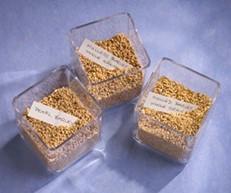Barley has been a long-time ingredient in animal feed rations and beer, a beverage enjoyed worldwide. But this ancient grain is also garnering attention by health professionals for its nutritional benefits for human health.
In scientific studies barley has been shown to reduce the risk of many diseases and provide important benefits to human health including reducing blood pressure, controlling blood sugar and lowering cholesterol. Universities such as Columbia, Stanford, California and University of Connecticut in the United States, Oxford Brookes (United Kingdom), Tokushima (Japan) and Lund (Sweden), in addition to the U.S. Department of Agriculture (USDA) conducted the research studies.
[[{“type”:”media”,”view_mode”:”media_large”,”fid”:”5901″,”attributes”:{“alt”:””,”class”:”media-image”,”height”:”417″,”style”:”float: left;”,”typeof”:”foaf:Image”,”width”:”417″}}]]
Barley offers many of the same healthy vitamins and minerals as other whole grains. However, barley also offers special health benefits because of its high levels of the soluble fiber, beta glucan. Even though some milling processes remove all or part of the bran layer, the health benefits apply because the fiber is distributed throughout the grain kernel and some bran may remain in the milled product.
Barley appears to have benefits for heart-health because beta glucan significantly lowers total cholesterol and low-density lipoprotein (LDL) levels by binding to bile acids and removing them from the body. In 2006, the U.S. Food and Drug Administration (FDA) approved a health claim that consuming barley-containing beta glucan may reduce one’s chances of developing heart disease.
Health professionals recommend eating at least 25 grams of dietary fiber every day, including a combination of soluble and insoluble fiber. In addition to being an excellent choice for both types of fiber, barley is a good source of many nutrients such as selenium, phosphorus, copper and manganese.
Barley is one of only two grains that contain significant levels of soluble fiber, which helps lower cholesterol; slows the process of digestion resulting in slower absorption of sugar, which may reduce the risk for developing non-insulin dependent diabetes; and helps maintain regular bowel function, which may help lower the risk for certain cancers such as colon cancer.
Finally, barley contains antioxidants, which are important to maintaining good health. The antioxidants work to slow down the rate of damage caused by free radicals that form when body cells use oxygen.
Because barley is available in several forms including pearled (in which all or part of the bran layer has been polished away), flour and flakes, it may be used in many different recipes for all meal occasions. It has a rich, nutty flavor and consistency similar to pasta. In particular, the grain makes a great addition to soups or other dishes that normally call for rice, such as stir-fry or pilaf.
[[{“type”:”media”,”view_mode”:”media_large”,”fid”:”5899″,”attributes”:{“alt”:””,”class”:”media-image”,”height”:”236″,”style”:”font-size: 13.008px; line-height: 1.538em;”,”typeof”:”foaf:Image”,”width”:”480″}}]]
For additional information on the nutritional benefits of barley, visit www.barleyfoods.org.


